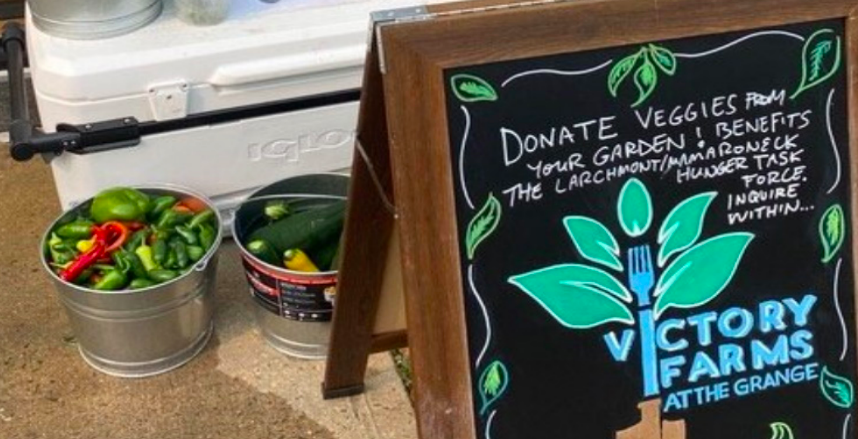Hunger Task Force Combats Food Insecurity
When the pandemic exacerbated already-present food insecurity, the Hunger Task Force rose to the occasion.
Photo Courtesy of Fatimah Khan
Victory Farms collects vegetables and herbs outside of Larchmont’s The Grange.
November 5, 2021
There’s no denying the negative impacts that COVID-19 has had and will continue to have on the Larchmont-Mamaroneck community. An issue that’s been one of the most pressing since the very beginning of the pandemic is food insecurity. The fact that the Larchmont-Mamaroneck Hunger Task Force’s food pantry was supporting around 800 families in the early weeks of the pandemic in April and May of 2020 says it all. This sudden increase of families that needed support was something that the food pantry, to no fault of their own, seemed to be ill-equipped to deal with. Lisa Chase, a Larchmont resident and one of the owners of the beloved local restaurant The Grange, was not ready to accept such a hopeless fate.
Chase had been brainstorming potential solutions to the extensive food insecurity in her community when she landed on one that she was particularly excited about: local backyard gardens with all of the vegetables grown donated to the food pantry. She knew that those who relied on the food pantry for meals had access to some vegetables, but that it was rare for them to obtain the type of high-quality but pricey vegetables that can be purchased at farmer’s markets. To her, this would not only be an effective, hands-on way to assist those hit worst by the pandemic, but it would also get people outdoors and add structure to their formerly structureless days. She started out by contacting about 50 local families she knew, asking if they wanted to get involved, and soon the project, given the triumphant name of Victory Farms, was in action.
Throughout last summer, the gardens involved in the project raised 300 pounds of herbs and vegetables. The whole of this impressive harvest went to the Larchmont-Mamaroneck Hunger Task Force. Chase was thrilled with the success of this first growing season, but a year later, it’s not the numbers that have stuck with her so much—it’s the responses of the people on the receiving end of the harvest.
She recalls having a conversation with someone who recently moved to Larchmont from another country and was being assisted by the food pantry, where they remarked “I used to have a garden where I came from,” and expressed true gratitude for the effort Chase had initiated. The words of her neighbor represent one of the main goals of the project: to foster an immediate connection to the food the people of Larchmont and Mamaroneck consume, a connection that Chase believes is extremely valuable. Hearing through their feedback that her neighbors agreed, Chase felt energized and ambitious to shoot even higher for the next season.
Victory Farms entered its 2021 summer growing season with a couple of beneficial changes. The number of families involved had nearly tripled since the previous summer and was sitting at around 140. They had also begun enlisting volunteers to help with the picking process at public gardens, many of whom are students at Mamaroneck High School. One of such students is Ellie Schwab (‘22), who first got involved a few months ago, at the beginning of the summer of 2021. During Schwab’s time as a volunteer, she has handed out seeds and seedlings to participants and also gone to the Murray Avenue School garden weekly to help pick the vegetables growing there.
Schwab commented that through her work with Victory Farms, she’s been able to “[see our] community come together to garden,” which she says has been “wonderful to [watch].”
She also reflected on how volunteering at the Larchmont-Mamaroneck Food Pantry in addition to her work with Victory Farms has given her a unique perspective. “I get to see the food go from the ground to people’s shopping bags.” Schwab’s had quite a remarkable experience in her work with Victory Farms, something that everyone involved can likely relate to.
The commitment that Victory Farms has made to serving the communities of Larchmont and Mamaroneck reminds us of the importance of supporting our communities, especially during hard times like these. Lisa Chase likes to describe their work as “neighbors feeding neighbors,” a phrase that highlights the dedication to collaboration and community that is at the heart of their work. Such dedication is a frequent characteristic among Larchmont and Mamaroneck residents, and for so many, living through a pandemic has only strengthened it.






